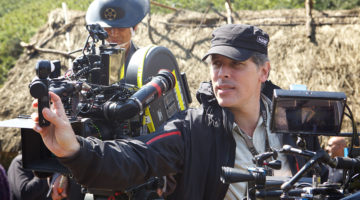Interview: Seth Rogen and Evan Goldberg discuss ‘This Is The End’
Seth Rogen had an enviable yet tricky task in his latest project. He is playing himself in a role – or at least a version of himself- and gets to hang out with five of his real life friends on screen, all of whom are also playing themselves. They get to goof and riff off one another, often times recreating for the camera conversations that would happen off camera not ten minutes before, while also toying with their celebrity image.
The difficulty comes when Rogen dons his writing and directing hat, telling the actors what to say and how to act, something that becomes all the more difficult not just because they are friends of equal comedic talents, but because they are playing versions of themselves.
“I’d say ‘settle’ a lot,” explained Rogen at the Toronto press day for This Is the End¸ the apocalyptic meta-comedy he wrote and directed alongside longtime creative partner Evan Goldberg. “’Settle’ is code for ‘shut the f*** up and start acting!’” he added, eliciting much laughter. “I was very upfront that was the subtext.”
It’s the directorial debut of both Rogen and Golberg, though the pair has many writing credits to the good, including Pineapple Express¸ The Green Hornet, and Superbad. For this project, which is based on a short film the two made years ago titled Jay and Seth Versus the Apocalypse, they brought in some familiar faces to play some familiar people.
Rogen joins Jay Baruchel, James Franco, Craig Robinson, Danny McBride, and Jonah Hill as a group of six that hides away in Franco’s house as the world collapses around them. The movie opens with Rogen welcoming Baruchel to Los Angeles, and the two head over to Franco’s for a party. Baruchel is reluctant, and he plays someone who is an outside to the Hollywood circles. Meanwhile Hill may or may not like Rogen and Baruchel, Franco really likes Rogen, Rogen is creeped out by Franco, and so on, with each character developing their own funny relationships.
“Our six guys would be the best,” says Goldberg of the film’s inception. They wanted these men to be the stars, and with their specific vision, Rogen and Goldberg became co-directors. “We’re the people who can actually get these six guys, and we thought it had to be these six guys.”
“We couldn’t unleash these guys on someone else,” added Rogen to laughter once more.
Still, Rogen had to become somewhat of a coach. It’s not about manipulating the guys, but finding out how to get their best, and at times compromising. He came up with the idea of a lounge to help facilitate getting each guy from his trailer when needed. It was never a challenge to get the fourth, fifth, or sixth person to the set, but instead the first one, as all would seem to want to know who else was already there.
“You don’t want to be the last guy to set when they’re six guys,” said Goldberg. “When you are the last guy, they will make fun of you, and in the scene they will say terrible things about you.” In fact, the group seemed to have a bit too much fun being mean. “If anything, the guys were more antagonistic with each other than we wanted,” explained Rogen. “We often had to stop Jonah [Hill] and Franco: ‘you guys like each other in this movie; we get it, you guys can make Moneyball jokes all day.’”
“They’d get up in the joy of slamming each other’s movies.”
There was a healthy peer pressure, offers Rogen, and in his lounge he kept things positive too. Each actor got to bring something of their choice, and so there was a pool table, video games, art for Franco, and beer for McBride. “What would happen in the rec-room was almost exactly what we would be filming. We’re essentially filming the same conversation three days later,” said Rogen.
While Rogen and Goldberg had a beginning and ending in mind, each actor contributed their respective characters story arc. “The guys were really instrumental themselves in coming up with a lot of it,” said Rogen, explaining they had a very specific idea for one character, and then tried to work backwards from there. “Because they were playing themselves, they didn’t care if they were playing bad versions, they just wanted to be interesting.”
They are indeed interesting – both embracing and subverting their public personas, and having a ton of fun with where they take things too. It’s the apocalypse after all, and a lot of crazy things happen. A lot.



